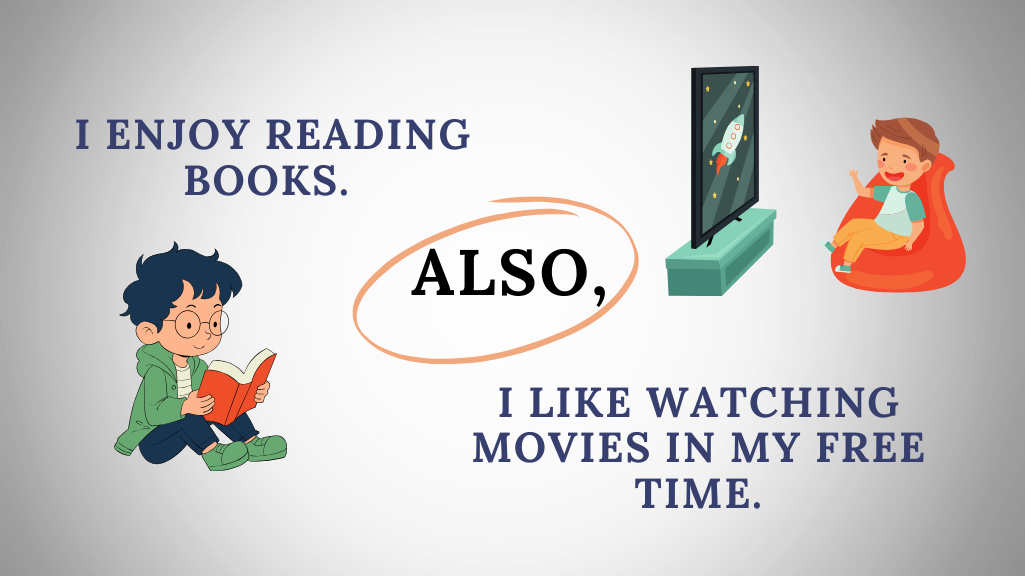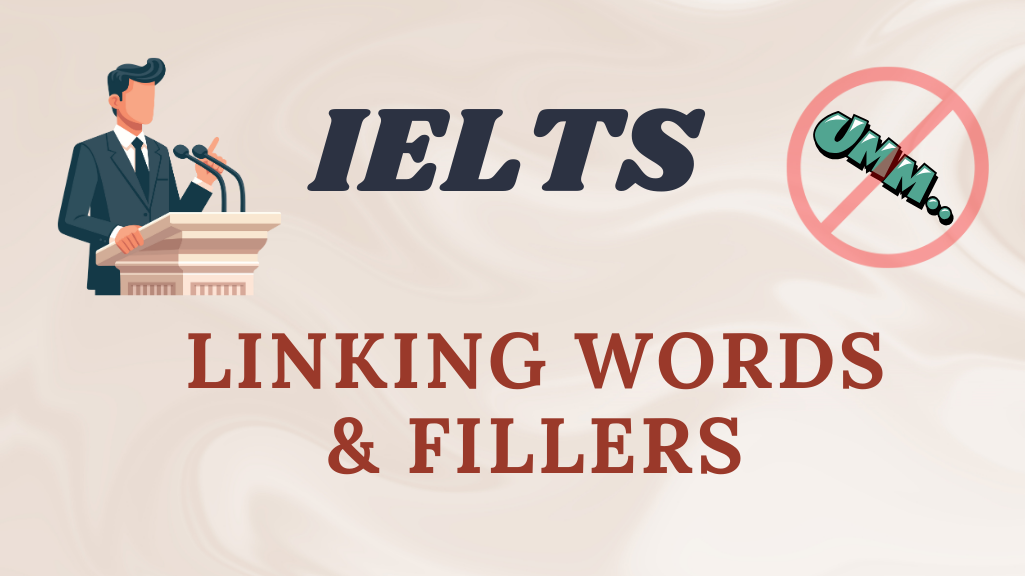If you want to do well in the IELTS Speaking test, fluency and coherence are super important. One way to sound more natural is by using linking words to connect your ideas smoothly and fillers to buy yourself a little thinking time (without those awkward pauses!). In this guide, I’ll walk you through some of the most useful linking words and fillers, with examples, to help you speak more confidently and naturally. Let’s get into it!
Linking Words
Linking words are words or phrases that connect sentences, ideas, or paragraphs to create a logical flow of information. They function as linguistic bridges that guide the listener or reader through the speaker or writer’s train of thought.
Example Without Linking Words:
"I like traveling. I visited Japan last year. It was an amazing experience. I also want to visit Italy."
Example With Linking Words:
"I like traveling. For example, I visited Japan last year, and it was an amazing experience. Moreover, I also want to visit Italy."
By adding linking words, the sentences flow more smoothly and sound more cohesive.

Functions of Linking Words
Linking words serve several key functions in communication:
A. Improving Coherence & Cohesion
- Coherence refers to the logical arrangement of ideas in a way that makes sense.
- Cohesion refers to the grammatical and lexical connections between sentences.
Example:
"I enjoy reading novels. Besides that, I also love writing short stories."
Here, "Besides that" connects two related ideas, making the sentence more cohesive.
B. Enhancing Fluency in Speech
In spoken English, linking words help reduce awkward pauses and improve the natural flow of conversation.
Example:
"Well… I think social media has both advantages and disadvantages. On one hand, it helps people stay connected. On the other hand, it can be addictive."
C. Organizing Ideas in a Logical Order
Linking words structure speech and writing by introducing, contrasting, or summarizing points.
Example:
"To begin with,* technology has improved communication. However, it also has some drawbacks. In conclusion, we must use it wisely."*
Types of Linking Words
1. Linking Words for Adding Information
Use these words when you want to add more details to your answer:
- Also
- Besides that
- Moreover
- Furthermore
- What’s more
- Not only that, but…
Example:
Question: What do you like to do in your free time?
Response: I enjoy reading books. Besides that, I also like watching documentaries about history and science.
2. Linking Words for Giving Examples
When explaining an idea, use these phrases to provide examples:
- For example
- For instance
- Such as
- Like
- Take … as an example
- To illustrate
Example:
Question: What are the advantages of learning a new language?
Response: Learning a new language can improve career opportunities. For example, many companies prefer employees who can speak more than one language.
3. Linking Words for Expressing Personal Opinion
If you need to express your thoughts or viewpoint, use:
- In my opinion
- Personally, I think…
- As far as I’m concerned…
- If you ask me…
- From my point of view…
Example:
Question: Do you think online learning is better than traditional learning?
Response: Personally, I think both have advantages, but traditional learning is better for social interaction.
4. Linking Words for Contrasting Ideas
When comparing two different points, use:
- However
- On the other hand
- But
- Whereas
- While
- Although
- Even though
Example:
Question: Do you prefer living in the city or the countryside?
Response: Living in the city is convenient because everything is nearby. However, the countryside is more peaceful and less crowded.
5. Linking Words for Explaining Cause and Effect
These words help you explain the reasons and consequences:
- Because
- Since
- As a result
- Therefore
- That’s why
- Due to
Example:
Question: Why do people exercise?
Response: People exercise because it helps them stay fit and healthy. As a result, they feel more energetic and productive.
6. Linking Words for Expressing Uncertainty
If you are unsure about something, use:
- I’m not sure, but I think…
- It’s hard to say, but…
- I suppose…
- I guess…
- Maybe…
Example:
Question: Will people stop using cash in the future?
Response: I’m not sure, but I think digital payments will become more common, and cash might disappear.
7. Linking Words for Summarizing or Concluding
When you want to wrap up your answer, use:
- In short
- To sum up
- Overall
- All in all
- In conclusion
Example:
Question: Why is it important to save money?
Response: Saving money helps people prepare for emergencies and future expenses. In short, it provides financial security.
Fillers in IELTS Speaking
The IELTS Speaking test assesses a candidate’s ability to communicate fluently and coherently in English. While fluency is crucial, candidates often need a moment to think before responding to questions. This is where fillers come in handy. Fillers are words or phrases that help speakers sound more natural while giving them time to organize their thoughts. However, excessive use of fillers can negatively impact fluency, so they should be used strategically

Why Use Fillers in IELTS Speaking?
- Gaining Time to Think – Fillers help avoid awkward pauses while you structure your response.
- Sounding More Natural – Native speakers often use fillers in everyday conversations.
- Maintaining Fluency – Using fillers properly prevents sudden breaks in speech.
- Enhancing Coherence – Some fillers connect ideas smoothly and improve the answer structure.
Um / Uh has 15-20% of all filler usage which should be avoided too stand out and make a great impression.
Common Fillers for IELTS Speaking
1. Fillers for Buying Time to Think
When faced with a difficult question, using these fillers can help you gather your thoughts:
- Well…
- Hmm, let me see…
- That’s an interesting question…
- Actually…
- Let me think for a second…
Example:
Question: What are the advantages of living in a big city?
Response: Well… I guess one of the main advantages is having access to better job opportunities.
2. Fillers to Start Your Response
These fillers help introduce your ideas in a natural way:
- To be honest…
- As far as I know…
- In my opinion…
- I would say that…
- If you ask me…
Example:
Question: Do you think social media has more advantages than disadvantages?
Response: To be honest, it depends on how people use it. On one hand, it helps people stay connected…
3. Fillers to Add More Information
If you need to expand your answer, use:
- Besides that…
- What’s more…
- Not only that, but…
- Another point is that…
Example:
Question: Why do people enjoy traveling?
Response: People love traveling because they can explore new places. What’s more, it helps them learn about different cultures.
4. Fillers for Clarifying or Rephrasing
If you need to explain something in a different way:
- What I mean is…
- In other words…
- Let me put it another way…
- To put it simply…
Example:
Question: What makes a good leader?
Response: A good leader should inspire others. In other words, they should lead by example rather than just giving orders.
5. Fillers for Giving Examples
When supporting your answer with an example, use:
- For instance…
- For example…
- Take … as an example…
- I remember once…
Example:
Question: How important is education in today’s world?
Response: Education is crucial for success. For example, most high-paying jobs require a university degree.
6. Fillers for Expressing Uncertainty
If you are unsure of your answer, you can say:
- I’m not sure, but I think…
- It’s hard to say, but…
- I suppose…
- I would imagine that…
Example:
Question: Do you think robots will replace teachers in the future?
Response: It’s hard to say, but I think teachers will always be needed for emotional support and guidance.
7. Fillers to Conclude Your Answer
To wrap up your response effectively:
- So, overall…
- In short…
- To sum up…
- All in all…
Example:
Question: Why do people prefer online shopping?
Response: Online shopping is convenient and saves time. To sum up, it’s a great option for busy people.
